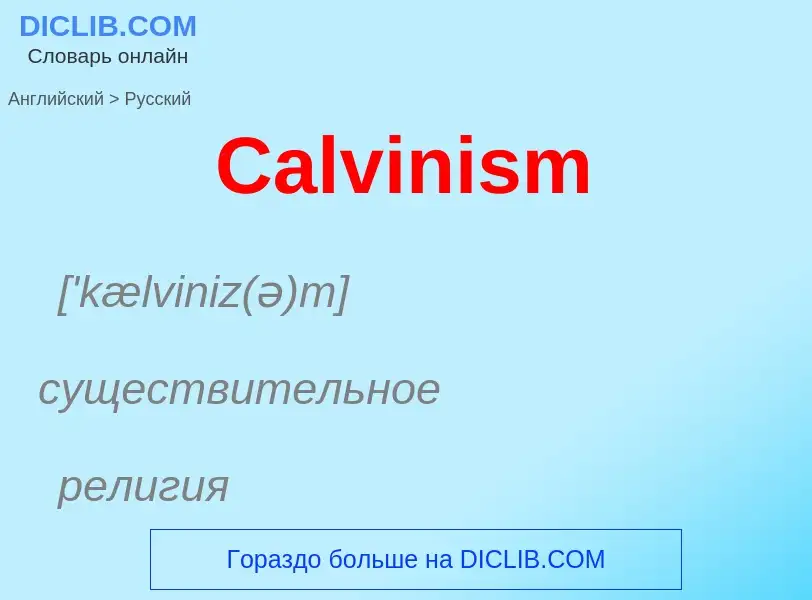Tradução e análise de palavras por inteligência artificial ChatGPT
Nesta página você pode obter uma análise detalhada de uma palavra ou frase, produzida usando a melhor tecnologia de inteligência artificial até o momento:
- como a palavra é usada
- frequência de uso
- é usado com mais frequência na fala oral ou escrita
- opções de tradução de palavras
- exemplos de uso (várias frases com tradução)
- etimologia
Calvinism - tradução para russo
['kælviniz(ə)m]
существительное
религия
кальвинизм
Definição
Wikipédia
Calvinism (also called the Reformed tradition, Reformed Protestantism, Reformed Christianity, or simply Reformed) is a major branch of Protestantism that follows the theological tradition and forms of Christian practice set down by John Calvin and other Reformation-era theologians. It emphasizes the sovereignty of God and the authority of the Bible.
Calvinists broke from the Roman Catholic Church in the 16th century. Calvinists differ from Lutherans (another major branch of the Reformation) on the spiritual real presence of Christ in the Lord's Supper, theories of worship, the purpose and meaning of baptism, and the use of God's law for believers, among other points. The label Calvinism can be misleading, because the religious tradition it denotes has always been diverse, with a wide range of influences rather than a single founder; however, almost all of them drew heavily from the writings of Augustine of Hippo twelve hundred years prior to the Reformation.
The namesake and founder of the movement, French reformer John Calvin, embraced Protestant beliefs in the late 1520s or early 1530s, as the earliest notions of later Reformed tradition were already espoused by Huldrych Zwingli. The movement was first called Calvinism in the early 1550s by Lutherans who opposed it. Many in the tradition find it either a nondescript or inappropriate term and prefer the term Reformed. The most important Reformed theologians include Calvin, Zwingli, Martin Bucer, William Farel, Heinrich Bullinger, Thomas Cranmer, Nicholas Ridley, Peter Martyr Vermigli, Theodore Beza, and John Knox. In the twentieth century, Abraham Kuyper, Herman Bavinck, B. B. Warfield, J. Gresham Machen, Louis Berkhof, Karl Barth, Martyn Lloyd-Jones, Cornelius Van Til, R. C. Sproul, and J. I. Packer were influential. Contemporary Reformed theologians include Albert Mohler, John MacArthur, Tim Keller, John Piper, Joel Beeke, and Michael Horton.
The Reformed tradition is largely represented by the Continental Reformed, Presbyterian, Evangelical Anglican, Congregationalist, and Reformed Baptist denominations. Several forms of ecclesiastical polity are exercised by a group of Reformed churches, including presbyterian, congregationalist, and some episcopal. The biggest Reformed association is the World Communion of Reformed Churches, with more than 100 million members in 211 member denominations around the world. More conservative Reformed federations include the World Reformed Fellowship and the International Conference of Reformed Churches.

![Dutch prime minister [[Abraham Kuyper]] initiated neo-Calvinism Dutch prime minister [[Abraham Kuyper]] initiated neo-Calvinism](https://commons.wikimedia.org/wiki/Special:FilePath/Abraham Kuyper 1905 (1).jpg?width=200)



![Calvin preached at [[St. Pierre Cathedral]] in [[Geneva]] Calvin preached at [[St. Pierre Cathedral]] in [[Geneva]]](https://commons.wikimedia.org/wiki/Special:FilePath/Geneva Cathedral.jpg?width=200)

![Early Calvinism was known for simple, unadorned churches, as shown in this 1661 painting of the interior of the [[Oude Kerk, Amsterdam]] Early Calvinism was known for simple, unadorned churches, as shown in this 1661 painting of the interior of the [[Oude Kerk, Amsterdam]]](https://commons.wikimedia.org/wiki/Special:FilePath/Interior of the Oude kerk in Amsterdam (south nave), by Emanuel de Witte.jpg?width=200)



.jpg?width=200)
![[[Moïse Amyraut]] formulated [[Amyraldism]], a modified Calvinist theology regarding the nature of [[Christ]]'s atonement.<ref>Iustitia Dei: A History of the Christian Doctrine of Justification. p.269 Alister E. McGrath – 2005 "The importance of this threefold scheme derives from its adoption by Moses Amyraut as the basis of his distinctive theology. Amyraut's 'hypothetical universalism' and his doctrine of the triple covenant between God and humanity is ..."</ref><ref>Hubert Cunliffe-Jones, ''A History of Christian Doctrine'' p. 436 2006 "The appointment of John Cameron, a peripatetic Scottish scholar, to be a professor in the Academy in 1618 introduced a stimulating teacher to the scene, and when in 1626 his pupil, Moses Amyraut (Amyraldus), was called to be a minister ..."</ref> [[Moïse Amyraut]] formulated [[Amyraldism]], a modified Calvinist theology regarding the nature of [[Christ]]'s atonement.<ref>Iustitia Dei: A History of the Christian Doctrine of Justification. p.269 Alister E. McGrath – 2005 "The importance of this threefold scheme derives from its adoption by Moses Amyraut as the basis of his distinctive theology. Amyraut's 'hypothetical universalism' and his doctrine of the triple covenant between God and humanity is ..."</ref><ref>Hubert Cunliffe-Jones, ''A History of Christian Doctrine'' p. 436 2006 "The appointment of John Cameron, a peripatetic Scottish scholar, to be a professor in the Academy in 1618 introduced a stimulating teacher to the scene, and when in 1626 his pupil, Moses Amyraut (Amyraldus), was called to be a minister ..."</ref>](https://commons.wikimedia.org/wiki/Special:FilePath/Moïse Amyraut.jpg?width=200)
![The seal of the [[Presbyterian Church in the United States of America]], an early American Presbyterian church The seal of the [[Presbyterian Church in the United States of America]], an early American Presbyterian church](https://commons.wikimedia.org/wiki/Special:FilePath/Presbyterian Church in the United States of America no background.png?width=200)
![''[[The Return of the Prodigal Son]]'' by [[Rembrandt]], based on the [[Parable of the Prodigal Son]] illustrating forgiveness ''[[The Return of the Prodigal Son]]'' by [[Rembrandt]], based on the [[Parable of the Prodigal Son]] illustrating forgiveness](https://commons.wikimedia.org/wiki/Special:FilePath/Rembrandt Harmensz van Rijn - Return of the Prodigal Son - Google Art Project.jpg?width=200)

